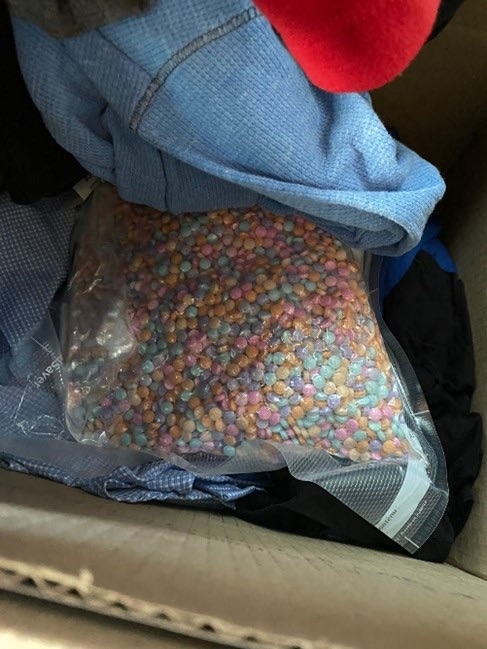Seven members of the infamous Sinaloa Cartel have been sentenced to prison in a landmark drug trafficking case for their roles in a major scheme including fentanyl, methamphetamine, and cocaine distribution. The defendants, who had previously pleaded guilty, were found to have played major roles in the cartel’s operations, which have been linked to the United States’ fentanyl problem.
The defendants, Hector Alejandro Apodaca-Alvarez, Mark Anthony Roque Bustamante, Jorge Moreno, Jonathan Nicholas Chavez, Luis Tejada Velasquez, Austin Toma Grupee, and Jose Chavez Zaragoza, were arrested in various locations across the United States. Law enforcement agencies closely monitored their activities, leading to a comprehensive investigation into their illicit operations.
The Drug Enforcement Administration’s (DEA) National Drug Threat Assessment has highlighted the Sinaloa Cartel as a key player in the fentanyl crisis, attributing its global supply chain networks and clandestine labs in Mexico as significant sources of the deadly drug. Fentanyl, described as the deadliest drug threat in U.S. history, has claimed the lives of tens of thousands of Americans, with just a single pill capable of causing death. The alarming potency of fentanyl has been underscored by laboratory testing, revealing that a staggering majority of seized pills contain lethal doses of the substance.
Deputy Attorney General Lisa Monaco emphasized the severity of the crimes committed by cartel members, stating that the significant sentences imposed reflect the gravity of their actions. She lauded the efforts of law enforcement officers in combating cartel activities, which she described as responsible for widespread violence and devastation in communities across the nation.
The Bureau of Alcohol, Tobacco, Firearms, and Explosives (ATF) also played a pivotal role in the investigation, underscoring the link between guns and drugs, particularly in the context of cartel operations. Director Steven Dettelbach reaffirmed ATF’s commitment to collaborating with partner agencies to hold accountable those responsible for trafficking drugs and firearms.
U.S. Attorney Markenzy Lapointe for the Southern District of Florida highlighted the devastating impact of the fentanyl epidemic, noting the thousands of lives lost to overdoses. Lapointe commended the collective efforts of law enforcement agencies in prosecuting cartel members and associates involved in perpetuating the crisis.
The case centered around Apodaca-Alvarez, who, despite prior convictions related to narcotics trafficking, continued to orchestrate large-scale drug distribution operations. Utilizing various means, including the U.S. mail and his trucking business, Apodaca-Alvarez facilitated the transport of substantial quantities of fentanyl, methamphetamine, and cocaine to an undercover agent in South Florida. His collaboration with other defendants, including Roque Bustamante, whom he sourced rainbow-colored fentanyl pills from, further facilitated the distribution network.

Seized rainbow-colored, pressed fentanyl pills. Photo was introduced into the court record during Tejada Velasquez’s sentencing hearing on May 15.
Recorded conversations revealed Apodaca-Alvarez’s direct coordination with members of the Sinaloa Cartel, including Ismael “El Mayo” Zambada Garcia, indicating the cartel’s involvement in the operation. The defendants’ activities spanned multiple states, with law enforcement seizing significant quantities of drugs and firearms linked to the conspiracy.
The sentencing of Tejada Velasquez, Roque Bustamante, Grupee, and Chavez marks a significant milestone in the legal battle against drug trafficking. Their respective prison terms reflect the severity of their involvement in perpetuating the crisis. Apodaca-Alvarez, Moreno, and Zaragoza had previously been sentenced, with Apodaca-Alvarez agreeing to the forfeiture of his assets.
The ATF Fort Lauderdale Field Division led the investigation, with support from various law enforcement agencies, including the DEA, Homeland Security Investigations Miami, Broward Sheriff’s Office, ATF Yuma Field Division, U.S. Marshals Service, and U.S. Postal Inspection Service. Assistant U.S. Attorneys led prosecution from the Southern District of Florida and the District of Arizona.
This operation is part of the ongoing efforts of the Organized Crime Drug Enforcement Task Forces (OCDETF) to identify, disrupt, and dismantle criminal organizations posing a threat to the United States. Through a coordinated, multi-agency approach, OCDETF aims to combat organized crime and safeguard communities from the scourge of drug trafficking.

